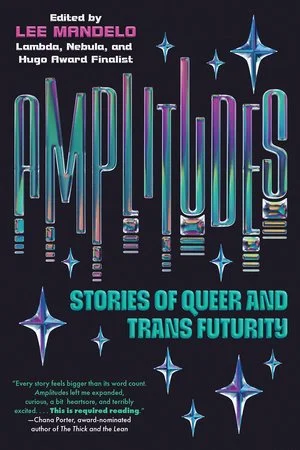TITLE: Amplitudes: Stories of Queer and Trans Futurity
EDITOR: Lee Mandelo
360 pages, Erewhon Books, ISBN 9781645660866 (paperback, e-book)
MY RATING: Recommended*
REVIEW: In Amplitudes: Stories of Queer and Trans Futurity, editor Lee Mandelo has brought together a thought-provoking and exciting set or stories that look at what the future (near and further out) might look like for queer people, written by authors whose lived experience falls all along the LGBTQIA+ spectrum. Some of these stories are brightly hopeful, some cautiously optimistic. Some tackle the repercussions of today’s backlash against the LGBTQIA+ community (and in particular, the attacks on Trans people). Some few even put the sexual aspect of our sexuality and culture at the forefront. All of the stories focus on characters solving problems – some of those problems being self-made, and some being societal. Many of them also comment on the nature of society to take advantage of the disadvantaged, the grieving, the lonely. As with all multi-author anthologies, not every story will work for every reader. The stories I loved, you may not, and vice versa. But I think there’s something in here to spark the interest and attention of every reader of science fiction.
Here are my thoughts on just a few of the stories contained in Amplititudes:
Sarah Gailey’s “Moonwife” explores what happens to our digital existence after we die. Our lives have already become increasingly digital, every aspect of our personalities online someplace. That digital footprint doesn’t just disappear when we die. Gailey posits a world where the seances and mediums of the past do their work digitally as well; it’s almost the same as contacting an actual spirit. And as there always is when technology and grieving people are concerned, there’s always someone willing and able to use the former to take advantage of the latter. As always with what I’ve read of Gailey’s work, there is a huge emotional punch at the center of the story, and a catharsis.
“Six Days” by Bendi Barrett is a more dystopian tale of community surviving the fall of civilization, in which even the smallest actions and absences have consequences. “There’s no better world that we don’t make ourselves,” one of the characters says in a contemplative moment. While the setting is dystopian, the mood of the story is quiet even in the moments fraught with danger. I was surprised at how the emotional underpinnings of the story snuck up on me. This may have been the first story by Barrett I’ve read; I sincerely hope it won’t be the last.
It took me a little while to really understand what was happening in Sunny Moraine’s “The They Whom We Remember,” and that appears to be by design of the author. Moraine is very effective at throwing the reader into the middle of a character’s dilemma and then mixing the character’s past and present together to fully reveal how that dilemma came about and how it is resolved. The story has a lot to say about internal identity and kept me guessing, in a good way, about what is going on with the main character and the world they live in.
“Sugar, Shadows” by Aysha U. Farah melds science fiction with classic private eye tropes. The narrator is tasked with finding a missing young man for his rich parents. Which proves to be easy enough – and then becomes increasingly complicated. I loved the way the story spooled out, both the mystery and the world-building. I also found what the story has to say about addiction (both the disease itself and those who prey on and take advantage of the addicted) thought-provoking.
Meg Elison’s “Bang Bang” is part tribute to the B-52s’s “Love Shack,” part dissection of club culture. It’s fast and punchy and hopeful without being trite. I had to reread it several times just to make sure I got all of the nods to one of the most infectious songs ever written, and to wring every bit of emotional nuance out of the text. It’s one of the shorter stories in the collection, but as the final entry, it encompasses so much of what the anthology is trying (and succeeding) at doing.
Anthologies like this, presenting a mix of established and emerging LGBTQIA+ writers looking to our future while acknowledging our present, are so vital. And as I said, there’s surely something (and more than one something) for everyone in the community, and for our allies.
I’ve previously reviewed Lee Mandeo’s novel Summer Sons and novella Feed Them Silence.
*I have moved away from a star-based rating system here on the blog (I can’t avoid using stars on Goodreads, NetGalley, and the various bookseller sites). Instead I am switching to ranking books as “highly recommended,” “recommended,” “satisfactory” and “not right for me.” I may add other levels as I refine this concept.
I received an electronic advance reading copy of this book for free from the publisher via NetGalley in exchange for an honest review. This does not affect my opinion of the book or the content of my review. I received and read the book before the publication date but fell behind on positing reviews. Amplitudes was released on May 27, 2025, and is available now wherever books are sold.
I love short fiction in all its forms: from novellas to novelettes, short stories, flash fiction, and drabbles. Sunday Shorts is the feature where I get to blog about it.
